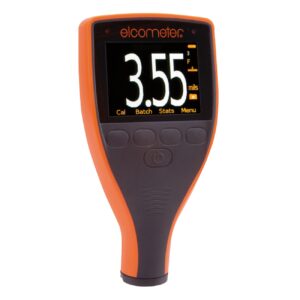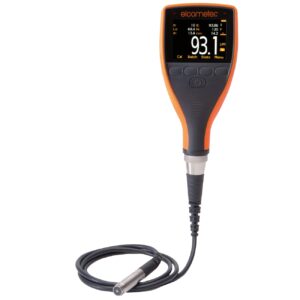Thickness, coating and adhesion gauges are essential tools in the modern machine shop. Thanks to their precision and reliability, these devices have become indispensable in ensuring the quality and safety of finished products. In this in-depth look, we will explore in detail what these instruments are, how they work, their advantages and answers to frequently asked questions.
The importance of thickness, coating and adhesion gauges
In the context of machine shops, accuracy is crucial. Thickness, coating and adhesion gauges are designed to provide accurate and repeatable measurements that are essential for quality control. These instruments enable the thickness of materials and coatings to be verified, ensuring that they meet the required specifications. Their ability to detect even the smallest variations in thickness is crucial to preventing manufacturing defects and ensuring compliance with industry standards.
How thickness gauges work
Thickness gauges use various technologies to take measurements. Among the most common are ultrasonic, magnetic and electromagnetic technology. Ultrasonic gauges, for example, emit sound waves that pass through the material and measure the time it takes for the echo to return. This time is then converted into a thickness measurement. Magnetic gauges, on the other hand, are ideal for ferrous materials and use the variation of the magnetic field to determine the thickness of the coating.
Practical applications of thickness gauges
These instruments find application in a wide range of industries. In the automotive industry, for example, they are used to check the thickness of paint and protective coatings. In the aerospace industry, they are used to check the structural integrity of components. Even in the shipbuilding industry, thickness gauges are essential to ensure the safety and durability of structures.
Advantages of using thickness gauges
The use of thickness gauges, coatings and adhesion offers numerous advantages. Firstly, they improve the efficiency of the production process by reducing the risk of errors and defects. In addition, they help reduce operating costs by minimising scrap and optimising material usage. Their accuracy allows high quality standards to be maintained, increasing customer satisfaction and the company's reputation.
Carry-over gauges: advanced technology
Coating gauges are specialised instruments used to determine the thickness of coatings applied to metal surfaces. These devices are particularly useful for ensuring that protective coatings, such as anti-corrosion coatings, are correctly applied. The technology behind coating gauges is similar to that of thickness gauges, but is optimised to detect coating materials.
Adhesion gauges: ensuring the hold of coatings
Adhesion meters are instruments designed to assess the adhesion strength between a coating and the underlying substrate. These devices are essential to ensure that coatings do not peel or flake off over time. Adhesion measurement is critical in industries such as construction and automotive, where the durability and strength of coatings are critical.
Frequently asked questions about thickness, coating and adhesion testers
1. What is the difference between a thickness gauge and a coating gauge?
The main difference lies in the type of material that each device is designed to measure. Thickness gauges are generally used to measure the thickness of solid materials, while coating gauges are specifically designed to measure the thickness of coatings applied to metal surfaces.
2. How is a thickness gauge calibrated?
Calibrating a thickness gauge is a critical process to ensure accurate measurements. Usually, reference samples with known thicknesses are used to calibrate the device. It is important to follow the manufacturer's instructions to ensure proper calibration.
3. What are the limits of adhesion testers?
Adhesion testers can be influenced by various factors, such as surface roughness and ambient temperature. It is essential to consider these variables during measurements to obtain reliable results.
Conclusions
Thickness, coating and adhesion gauges are indispensable tools for machine shops and other industries. Their ability to provide accurate and reliable measurements is critical to ensuring product quality and safety. Investing in these devices not only improves operational efficiency, but also helps maintain high quality standards, strengthening a company's competitive position in the market.
Showing all 4 results

